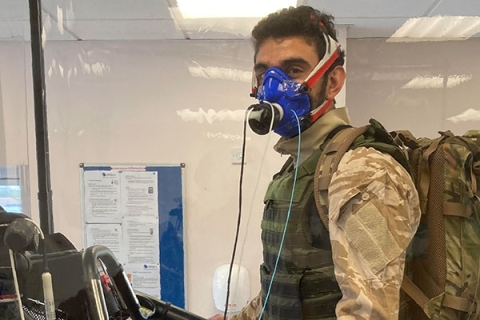

The purpose of this study is to identify if regular training with loads (body armour, weighted backpacks) on the torso leads to improvements in breathing function, physical performance and how your brain processes information.
Exercising whilst carrying load on the torso has been shown to increase the metabolic strain, impact breathing function, gait characteristics and elements of working memory.
Soldiers who routinely carry torso-borne loads in their training should experience some type of adaptation and experience less physiological strain, or be better at coping with loads, compared with inexperienced load carriers. While there is some evidence that energy cost might be improved in response to such training, it is unknown if respiratory muscle adaptations occurs. This has implications for the design of military load carriage training programmes seeking to maximise load carriage training efficiencies.
Thus, the purpose of the proposed study is to identify if regular bouts of load carriage training induce ventilatory system adaptations that enhance the performance of load carriage tasks.
Participants must be
- Healthy
- Male
- Aged 18-50
- Free from disease or injury that could make participation dangerous (this includes back, hip and knee problems, asthma and COVID-19).
- Does not routinely undertake hiking with a heavy backpack/exercise with a heavy weighted vest
- Undertakes at least 150 minutes of moderate (you get slightly out of breath) exercise per week or 70 minutes of vigorous (results in rapid breathing and heart rate) exercise per week
Participation requires you to attend a total of nine sessions (4 familiarisation sessions and 5 experimental sessions), lasting 1.5 to 4 hours. This will span over the period of 15/16 calendar days with rest days in between (e.g. Option 1: 22nd November 2021 - 8th December 2021; Option 2:10th January 2022 to 26th January 2022; Option 3: 31st January 2022 to 16th February 2022). However, in total you will only need to attend the laboratory on 7 separate days. Due to the experimental design, participation will require availability on specific fixed days/times within an allocated schedule.
What will participants be doing?
The familiarisation sessions will be used to show you how the different tests work and to get you comfortable with performing them.
During the first experimental session (ET1) we will assess your general level of fitness. This will be done using 6 tests from the British Army’s Soldier Conditioning Review. These tests include: horizontal broad jumps to measure lower limb explosive power; seated medicine ball (4 kg) throws to measure upper body power; deadlifts to measure lower limb strength; short (20 m) sprints to measure lower body explosive power and anaerobic capacity; pull ups to measure upper body strength; and a 2.0 km best effort run to measure aerobic fitness.
During the remaining experimental sessions (ET2-ET5) you will be required to walk (for 50 minutes) and run for 2.0 km (on a treadmill) with or without load (25 kg) carried on your torso. A range of physiological (all non-invasive), perceptual and cognitive measures will be recorded during testing sessions. These will include measures of running ability, muscular strength, breathing function, cardiovascular fitness and cognition.
What will participants receive as a reward for their participation?
You will receive a maximum gratuity of £95 (pro rata) for taking part (subject to NI and tax)
What is the closing date for applications?
28 February 2022
How do applicants apply?
To express interest in volunteering for this project and for further information please contact Josh Osofa by email: josh.osofa@port.ac.uk
Ethics code: 1065/MODREC/20





